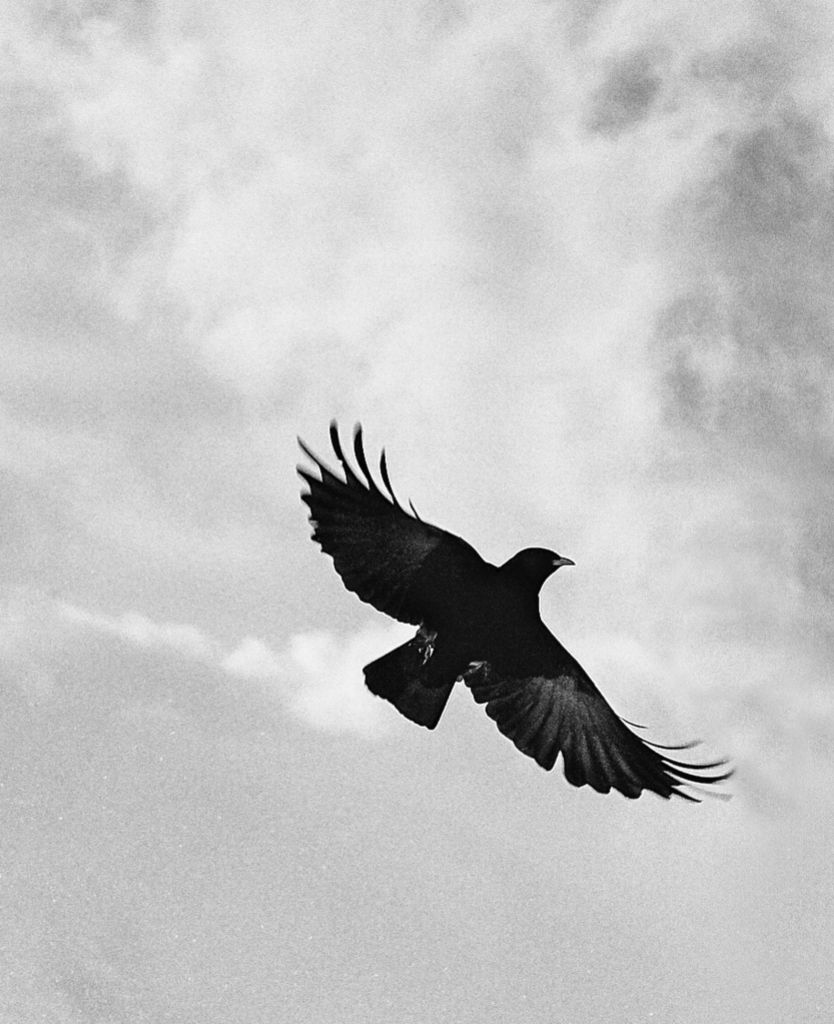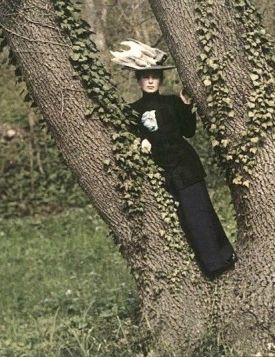* * *
Bridges of Iron and Bone
His bed faces south, towards the black struts that gape like a dragon’s ribcage and the sun and the low red clouds. This is hard-won victory on her part. There are so many patients, so many broken bones and minds and pinions snapped like flower stems with red and marrow-sweet sap, and why should he have the south window, he who cannot see it? The other nurses with their crisp white uniforms and fangs and perfume of myrrh and grave dust look at her with anger, smirk with derision. It is not their place to care that he feels the sunlight on his face, or that his legs are shattered from the fall like a favorite teacup, or that the doctors snap their pointed tails and hiss that he will never see again.
But after everything, she is still human, and she cares.
He came on a Friday evening, folded into a stretcher of yellow rags like an envelope bearing news of a death. Blood matted his hair and sheeted over the empty black eye sockets. His mouth was beautiful and raw as a wound. She found an empty bed for him and pushed it into the sunlight that fell like jaundice through the scarlet sky.
On Sunday morning, when she opened his lips for a sip of milk, she heard him whisper. “You cannot stop an angel who truly wants to fall.” The words became a gray vapor in the air, smelling of salt.
She stroked his forehead, and felt the pinprick scars of his Fall like blind letters beneath her fingertips.
*
There is only one bridge in Pandemonium. It is taller than the tallest tower and the city crouches in its shadow, black and silent. Like the world serpent, it swallows its own tail, enclosing the earth that bore it without beginning or end. The river beneath it is black and hard as concrete. It smells like sulfur, like funeral flowers, like a slaughterhouse, like rot. It smells like a suicide's perfume. The water runs as thin as the backing on a paste diamond, or as deep as a mother's sorrow. It doesn't matter. Skulls, wings, hearts, promises - everything breaks when it hits the river.
On Monday, he fingers the bandages above his eyes. They are clean and hard and white, like bones stripped by crows. He pushes against them as though he is trying to reach the emptiness underneath, the horrible scar of his sanity, for it is only the mad who keep their vision here. If he could see the things around him, twisted and terrible and beautiful, perhaps he would know his blindness for a blessing.
But then, he cannot see her.
His broken lips twist but he does not make a sound. Slowly, he trails his fingers down across his hollow cheeks, his skeletal chest, his hips, until he finds the place where his legs are nothing but skin and fragments of bone.
"It was a long fall," she says. "No one could have survived it."
He begins to whimper. Blood soaks his bandages instead of tears.
*
The bridge over Pandemonium is built of iron and bone. They weave together like a net, like a thousand crosses, and the tarmac road beneath is as smooth and oily as skin. The road is narrow, the gaps in the skeleton so large, it would be perilously easy to fall by accident. But no one ever does.
On Tuesday he refuses to eat. He lies in bed as though it is his coffin, perfectly still, until the sun finds his southern window and forces its way in. Then he tents the musty blankets over his face.
At dinner time, she tries to force a spoonful of soup between his teeth. He clenches his jaw and turns his face away from her. But when she stands to go, he catches her hand in his fist. She stops still, her pulse hammering, but he says nothing. Only rolls the tiny bones between his fingers like rosary beads.
*
There is also a bridge in the town where we grew up. The road beneath it is local limestone, green and white with lichen, and its frame is orange steel. She loved to stand barefoot on the limestone curb, bracing herself against the blood-orange bones, and watch the green river come tumbling over the jagged rocks below. The water ran fast, like madness, like a nightmare, and in the cool evening it looked as smooth and soft and inviting as silk.
On Wednesday, he begins to speak. The doctors listen for a moment, shaking their horned heads, and the other nurses rush past with impatient frowns. he sits on the low chair beside him and strokes his forehead, ever so lightly, and feels the words like nails in her palms.
"She hid it well at first," he says, "but it began to break through her conversation, little mice nibbling through a stone wall. She'd mentioned siblings she never had, jobs she'd never held. Just little slips, so easy to dismiss, so difficult to ignore."
She breathes deeply. His words smell like sweat and lithium.
"Then there were the accusations. She said that I was drugging her food. She thought the medicines were poisoning her, the psychiatrists and therapists were rapists and torturers. I pleaded with her, I argued. I thought about grinding her pills to powder and sneaking them into her tea, but I knew she'd never forgive me for it. That still mattered to me, then."
Of course it did, she thinks. You were still human.
"So I watched sanity leave her," he says. "I watched her welcome the madness."
Drops of blood blossom on the bandages over his eyes, and she strokes his forehead, and she weeps. She wants to tell him that she forgives him, that you cannot stop an angel who truly wants to fall, that he was only human, that none of it matters. But he is so broken, so blind, and she sees the sun passing the window in its veil of blood, and she keeps her silence.
*
We used to stand in the river beneath the bridge and listen to the cars as they rumbled overhead. It was dark and cool and it smelled like rain, like damp earth and open graves. Children and drunks had painted things in bright colors on the limestone, but we didn't. We never intended to leave a mark. All we wanted was the silence, the peace, the river at our feet, the bridge as high as heaven above our heads.
On Thursday the words come like vomit, spilling out of his bloodied mouth with the smell of brimstone and ash. "I didn't want her to jump," he says, again and again, clutching her hand, grinding the bones together. "I never wanted her to jump. I thought about what a relief it would be, to stop watching her, to stop worrying. To stop spending every moment on guard against sleeping pills and brandy and nooses and knives.She was so clever. It didn't have to be poison or a slash to the wrist. She could turn the gas on while we were sleeping. She could slit an artery in her thigh and hide it beneath her stockings and I'd never know she was bleeding to death while we danced. I wanted the fear to stop. But that didn't mean I wanted her to jump."
She kisses his mouth and feels his words pouring into her, the blood and the fear and the guilt, the smell of brimstone and ashes, the taste of iron and bone. "I know," she says, and he swallows her forgiveness, choking.
*
She fell like an angel. Her back arched, her hair streaming around her, her eyes wide and unseeing. She fell, and I saw her blood flowing redblack over the limestone, and I stood on a bridge of steel and skin, iron and bone. And I flung myself after her, I threw myself into her shadow, because I was overcome with relief, because I didn't see the black river below me, because even though I've known forever that you cannot catch an angel who wants to fall, still, still, you have to try.
On Friday he sits up in bed and screams, screams until blood spills over his chin. The other nurses look away as she takes him in her arms and rocks him like a child, rocks him to the beat of the pain that pulses through her ruined skull. She remembers the orange bridge and the bridge of bone. She remembers the way he watched her as she fell, his eyes black and whole, and he screamed her name futilely, as she will scream his name, endlessly in this hospital below the bridge that goes on forever--futilely, because the first thing you learn in Pandemonium, the first truth that is the hardest to swallow, that sticks in your throat like bone, is that you cannot save an angel who truly wants to fall.
Saturday, January 11, 2014



0 comments:
Post a Comment